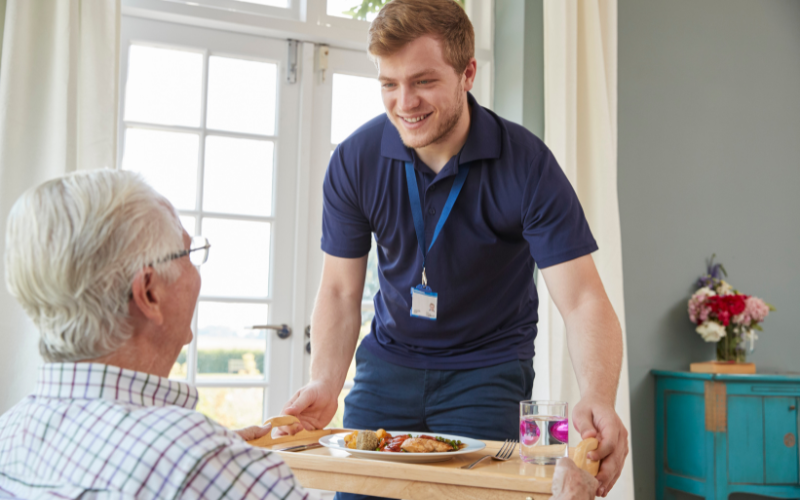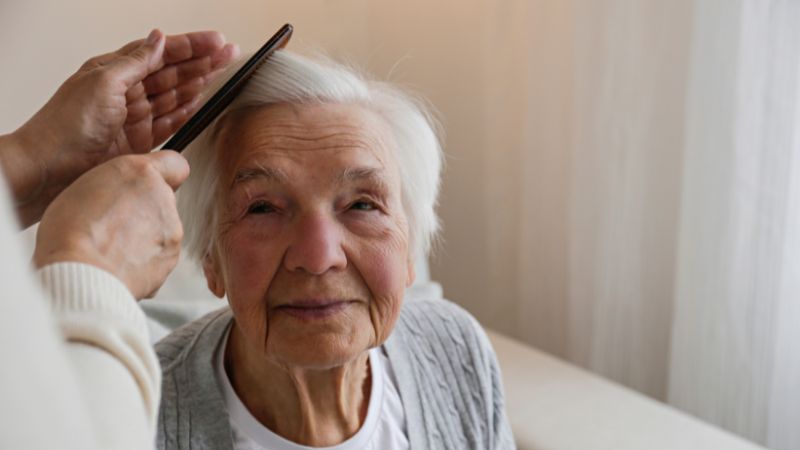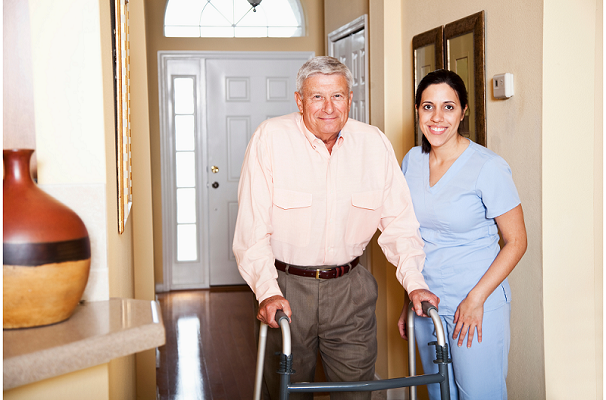
Older adults have a higher risk for developing dehydration. When the elderly fail to consume an adequate amount of liquids throughout the day, dehydration can set in and cause a host of health problems. A senior who is dehydrated will present several warning signs.
What is dehydration?
The body requires sufficient liquids in order to perform. When people lose more fluids than they consume, the body becomes dehydrated. The loss of bodily fluids may be caused by sweating, vomiting or diarrhea. Mild dehydration may be corrected at home; severe dehydration requires emergency care.
Drinking fluids introduces water into the body. Without enough water, the organ’s, tissues, and cells are unable to operate normally. Dangerous health complications can result. Once dehydration sets in, it is crucial to correct it immediately; otherwise, the body could go into shock.
Water allows the body to engage in a variety of processes. In addition to the aforementioned, fluids help regulate temperature, eliminate bodily waste and lubricate the joints. As people grow older, they need to continue to consume adequate amounts of fluid throughout each day to remain functional.
Why do seniors have a high risk for dehydration?
The aging process reduces the total amount of fluid in the body. Seniors naturally have fewer water reserves upon which their bodies can rely. Thirst is a signal that the body needs water. However, older people’s thirst response grows weaker with age. Seniors may not realize they need to drink.
Seniors are also highly prone to dehydration because their kidneys’ functions decline with age. As a result, more water is lost through urination. Furthermore, older adults’ prescription medications and many health conditions can contribute to increased water being released through urination.
Dementia patients may forget to hydrate throughout the day. Diseases, like diabetes, can cause frequent urination, so seniors avoid drinking liquids regularly. Seniors who are immobile may lack the physical ability to independently access sufficient quantities of water throughout the day.
What are signs of mild dehydration?
Dehydration can range from mild to severe. Common symptoms of mild dehydration include dry mouth, fatigue or tiredness, muscle cramping, sunken eyes and feeling lightheaded or dizzy. The most telling signal of dehydration is thirst. Seniors may dismiss thirst, so caregivers should look for other warning signs.
What are signs of severe dehydration?
Symptoms of severe dehydration warrant immediate medical attention. A rapid heart rate, trouble with walking or moving, confusion or disorientation and fainting are signals that the senior is severely dehydrated. Vomiting or diarrhea that last over 24 hours are also warning signs.
Urine is a good indicator of whether or not the senior is consuming adequate liquids. A decrease in urination can point to dehydration. Urine that is a darker color than normal reveals that dehydration has set in. Clear urine, on the other hand, is an indicator of healthy hydration.
What are the health consequences of dehydration?
Ill health is an outcome of dehydration that is not treated. Complications that can arise from an inadequate intake of fluids include urinary tract infections, kidney stones and even kidney failure. Dehydration leads to low levels of potassium and sodium, which can cause seizures.
Heat exhaustion or heat stroke can also occur. Plus, without sufficient fluids, the human body responds with low blood volume. Due to severe fluid loss, the heart cannot pump enough blood to the body, leading to the life-threatening condition known as hypovolemic shock. Organ failure can result.
What are ways to prevent dehydration?
Older adults can prevent dehydration by consuming the recommended amounts of liquid per day. For women, this means drinking 92 fluid ounces (or 11.5 cups) per day. Men should aim to drink 124 fluid ounces (or 15.5 cups) per day. Seniors living in hot areas should increase their fluid intake.
Water is plentiful and hydrating. Additional beverages, like milk, sparkling water, or fruit juices, may be included in a senior’s diet to help with hydration. Coffee and tea are not recommended in large amounts, as they produce a diuretic effect.
Foods with a high-water content are also advised. Seniors should incorporate fruits, like watermelon and strawberries, and veggies, like cucumber and celery, into their daily diets. Soups and low-sodium broths are also excellent foods that keep dehydration at bay.
Drinking more fluids than normal is essential when a senior is sick with a fever, diarrhea, or vomiting. An underlying health condition should prompt the senior to seek the advice of a medical professional about specific hydration needs. Follow exercise with an increased water intake.
Caregivers can be instrumental in promoting daily hydration in senior care recipients. Gentle reminders, especially after exercise or during meals, can encourage seniors to drink fluids. Caregivers are urged to make water accessible, such as placing bottles or glasses of water in easy-to-reach places.

Hydration is a daily necessity, especially for vulnerable seniors. At Assisting Hands Home Care, we make sure your elderly loved one consumes adequate amounts of fluids each day. Our professional caregivers are trained to meet the needs of seniors in the comfort of their home environment.
Assisting Hands Home Care providers give seniors friendly reminders to consume beverages and stay hydrated. Another core responsibility is timely medication reminders. If your loved one does not drive, we provide transportation to the grocery, doctor’s offices, and senior centers.
Seniors who are wheelchair bound or otherwise disabled can rely on our dedicated caregivers. We help these individuals with everyday tasks, including laundry, meal preparation, and household chores. Caregivers also make sure these seniors are able to access water and other beverages throughout the day.
Whether your loved one would benefit from overnight care, respite care, post-operative care or long-term care, Assisting Hands Home Care will customize an elder care plan to meet those needs. Our non-medical home health care services are flexible and may be updated as care progresses.
Aging comfortably in place is achievable with compassionate support from home care agencies, like Assisting Hands Home Care. Our insured, bonded, and licensed caregivers are committed to improving the quality of life for seniors living in the communities surrounding Lombard, Villa Park and Elmhurst, Illinois.














